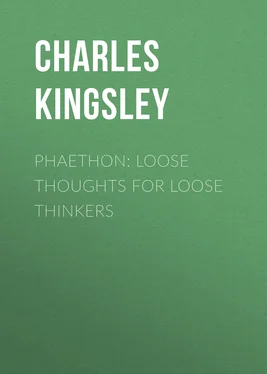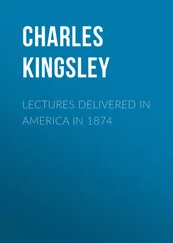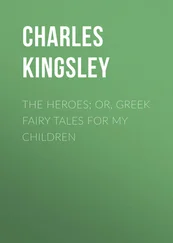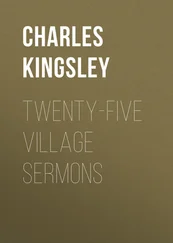Charles Kingsley - Phaethon - Loose Thoughts for Loose Thinkers
Здесь есть возможность читать онлайн «Charles Kingsley - Phaethon - Loose Thoughts for Loose Thinkers» — ознакомительный отрывок электронной книги совершенно бесплатно, а после прочтения отрывка купить полную версию. В некоторых случаях можно слушать аудио, скачать через торрент в формате fb2 и присутствует краткое содержание. Жанр: foreign_prose, Религиозная литература, foreign_religion, foreign_antique, на английском языке. Описание произведения, (предисловие) а так же отзывы посетителей доступны на портале библиотеки ЛибКат.
- Название:Phaethon: Loose Thoughts for Loose Thinkers
- Автор:
- Жанр:
- Год:неизвестен
- ISBN:нет данных
- Рейтинг книги:3 / 5. Голосов: 1
-
Избранное:Добавить в избранное
- Отзывы:
-
Ваша оценка:
- 60
- 1
- 2
- 3
- 4
- 5
Phaethon: Loose Thoughts for Loose Thinkers: краткое содержание, описание и аннотация
Предлагаем к чтению аннотацию, описание, краткое содержание или предисловие (зависит от того, что написал сам автор книги «Phaethon: Loose Thoughts for Loose Thinkers»). Если вы не нашли необходимую информацию о книге — напишите в комментариях, мы постараемся отыскать её.
Phaethon: Loose Thoughts for Loose Thinkers — читать онлайн ознакомительный отрывок
Ниже представлен текст книги, разбитый по страницам. Система сохранения места последней прочитанной страницы, позволяет с удобством читать онлайн бесплатно книгу «Phaethon: Loose Thoughts for Loose Thinkers», без необходимости каждый раз заново искать на чём Вы остановились. Поставьте закладку, и сможете в любой момент перейти на страницу, на которой закончили чтение.
Интервал:
Закладка:
Charles Kingsley
Phaethon: Loose Thoughts for Loose Thinkers
PHAETHON; LOOSE THOUGHTS FOR LOOSE THINKERS. 1852
Templeton and I were lounging by the clear limestone stream which crossed his park and wound away round wooded hills toward the distant Severn. A lovelier fishing morning sportsman never saw. A soft gray under-roof of cloud slid on before a soft west wind, and here and there a stray gleam of sunlight shot into the vale across the purple mountain-tops, and awoke into busy life the denizens of the water, already quickened by the mysterious electric influences of the last night’s thunder-shower. The long-winged cinnamon-flies spun and fluttered over the pools; the sand-bees hummed merrily round their burrows in the marly bank; and delicate iridescent ephemeræ rose by hundreds from the depths, and, dropping their shells, floated away, each a tiny Venus Anadyomene, down the glassy ripples of the reaches. Every moment a heavy splash beneath some overhanging tuft of milfoil or water hemlock proclaimed the death-doom of a hapless beetle who had dropped into the stream beneath; yet still we fished and fished, and caught nothing, and seemed utterly careless about catching anything; till the old keeper who followed us, sighing and shrugging his shoulders, broke forth into open remonstrance:
“Excuse my liberty, gentlemen, but what ever is the matter with you and master, sir? I never did see you miss so many honest rises before.”
“It is too true,” said Templeton to me with a laugh. “I must confess I have been dreaming instead of fishing the whole morning. But what has happened to you, who are not as apt as I am to do nothing by trying to do two things at once?”
“My hand may well be somewhat unsteady; for to tell the truth, I sat up all last night writing.”
“A hopeful preparation for a day’s fishing in limestone water! But what can have set you on writing all night after so busy and talkative an evening as the last, ending too, as it did, somewhere about half-past twelve?”
“Perhaps the said talkative evening itself; and I suspect, if you will confess the truth, you will say that your morning’s meditations are running very much in the same channel.”
“Lewis,” said he, after a pause, “go up to the hall, and bring some luncheon for us down to the lower waterfall.”
“And a wheelbarrow to carry home the fish, sir?”
“If you wish to warm yourself, certainly. And now, my good fellow,” said he, as the old keeper toddled away up the park, “I will open my heart—a process for which I have but few opportunities here—to an old college friend. I am disturbed and saddened by last night’s talk and by last night’s guest.”
“By the American professor? How, in the name of English exclusiveness, did such a rampantly heterodox spiritual guerilla invade the respectabilities and conservatisms of Herefordshire?”
“He was returning from a tour through Wales, and had introductions to me from some Manchester friends of mine, to avail himself of which I found he had gone some thirty miles out of his way.”
“Complimentary to you, at least.”
“To Lady Jane, I suspect, rather than to me; for he told me broadly enough that all the flattering attentions which he had received in Manchester—where, you know, all such prophets are received with open arms, their only credentials being that, whatsoever they believe, they shall not believe the Bible—had not given him the pleasure which he had received from that one introduction to what he called ‘the inner hearth-life of the English landed aristocracy.’ But what did you think of him?”
“Do you really wish to know?”
“I do.”
“Then, honestly, I never heard so much magniloquent unwisdom talked in the same space of time. It was the sense of shame for my race which kept me silent all the evening. I could not trust myself to argue with a gray-haired Saxon man, whose fifty years of life seemed to have left him a child in all but the childlike heart which alone can enter into the kingdom of heaven.”
“You are severe,” said Templeton, smilingly though, as if his estimate were not very different from mine.
“Can one help being severe when one hears irreverence poured forth from reverend lips? I do not mean merely irreverence for the Catholic Creeds; that to my mind—God forgive me if I misjudge him—seemed to me only one fruit of a deep root of irreverence for all things as they are, even for all things as they seem. Did you not remark the audacious contempt for all ages but ‘our glorious nineteenth century,’ and the still deeper contempt for all in the said glorious time who dared to believe that there was any ascertained truth independent of the private fancy and opinion of—for I am afraid it came to that—him, Professor Windrush, and his circle of elect souls? ‘You may believe nothing if you like, and welcome; but if you do take to that unnecessary act, you are a fool if you believe anything but what I believe—though I do not choose to state what that is.’ Is not that, now, a pretty fair formulisation of his doctrine?”
“But, my dear raver,” said Templeton, laughing, “the man believed at least in physical science. I am sure we heard enough about its triumphs.”
“It may be so. But to me his very ‘spiritualism’ seemed more materialistic than his physics. His notion seemed to be, though heaven forbid that I should say that he ever put it formally before himself—”
“Or anything else,” said Templeton, sotto voce.
“—that it is the spiritual world which is governed by physical laws, and the physical by spiritual ones; that while men and women are merely the puppets of cerebrations and mentations, and attractions and repulsions, it is the trees, and stones, and gases, who have the wills and the energies, and the faiths and the virtues and the personalities.”
“You are caricaturing.”
“How so? How can I judge otherwise, when I hear a man talking, as he did, of God in terms which, every one of them involved what we call the essential properties of matter—space, time, passibility, motion; setting forth phrenology and mesmerism as the great organs of education, even of the regeneration of mankind; apologising for the earlier ravings of the Poughkeepsie seer, and considering his later eclectico-pantheist farragos as great utterances: while, whenever he talked of Nature, he showed the most credulous craving after everything which we, the countrymen of Bacon, have been taught to consider unscientific—Homœopathy, Electro-biology, Loves of the Plants à la Darwin, Vestiges of Creation, Vegetarianisms, Teetotalisms—never mind what, provided it was unaccredited or condemned by regularly educated men of science?”
“But you don’t mean to assert that there is nothing in any of these theories?”
“Of course not. I can no more prove a universal negative about them than I can about the existence of life on the moon. But I do say that this contempt for that which has been already discovered—this carelessness about induction from the normal phenomena, coupled with this hankering after theories built upon exceptional ones—this craving for ‘signs and wonders,’ which is the sure accompaniment of a dying faith in God, and in nature as God’s work—are symptoms which make me tremble for the fate of physical as well as of spiritual science, both in America and in the Americanists here at home. As the Professor talked on, I could not help thinking of the neo-Platonists of Alexandria, and their exactly similar course—downward from a spiritualism of notions and emotions, which in every term confessed its own materialism, to the fearful discovery that consciousness does not reveal God, not even matter, but only its own existence; and then onward, in desperate search after something external wherein to trust, towards theurgic fetish worship, and the secret virtues of gems and flowers and stars; and, last of all, to the lowest depth of bowing statues and winking pictures. The sixth century saw that career, Templeton; the nineteenth may see it re-enacted, with only these differences, that the Nature-worship which seems coming will be all the more crushing and slavish, because we know so much better how vast and glorious Nature is; and that the superstitions will be more clumsy and foolish in proportion as our Saxon brain is less acute and discursive, and our education less severely scientific, than those of the old Greeks.”
Читать дальшеИнтервал:
Закладка:
Похожие книги на «Phaethon: Loose Thoughts for Loose Thinkers»
Представляем Вашему вниманию похожие книги на «Phaethon: Loose Thoughts for Loose Thinkers» списком для выбора. Мы отобрали схожую по названию и смыслу литературу в надежде предоставить читателям больше вариантов отыскать новые, интересные, ещё непрочитанные произведения.
Обсуждение, отзывы о книге «Phaethon: Loose Thoughts for Loose Thinkers» и просто собственные мнения читателей. Оставьте ваши комментарии, напишите, что Вы думаете о произведении, его смысле или главных героях. Укажите что конкретно понравилось, а что нет, и почему Вы так считаете.












